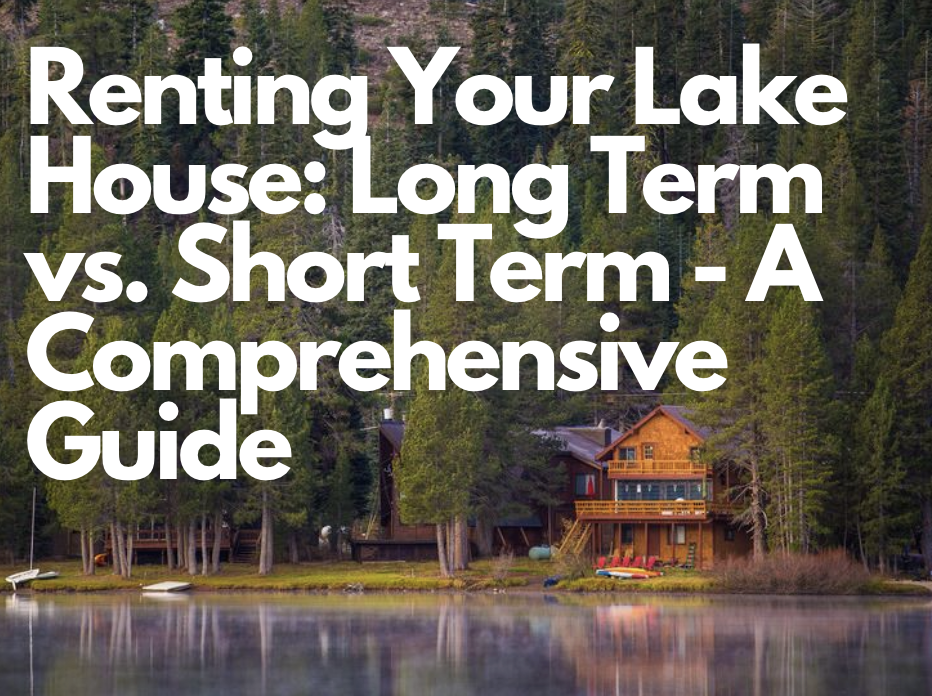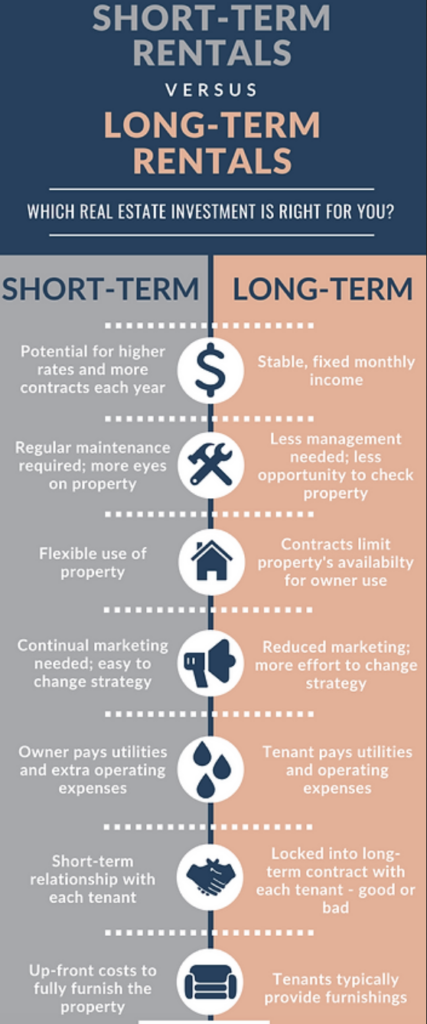
If you’re fortunate enough to own a lake house, you might be considering renting your lake home out to make the most of your investment or to offset maintenance costs. Renting out your property can be an excellent source of income, but it also comes with its share of responsibilities and decisions. In this comprehensive guide, we will explore the best ways of renting your lake home, both for long-term and short-term rentals, discussing advertising options, the role of real estate agents, how to calculate market rent value, and the pros and cons of owning rental property.
Advertising Your Lake House
a. Online Listing Websites:
Airbnb: is a go-to platform for short-term rentals. It offers a user-friendly interface, allowing you to create a detailed listing with photos, descriptions, and pricing. You can also set house rules and communicate with guests easily through the platform. Airbnb’s review system helps build trust with potential renters.
VRBO (Vacation Rental By Owner): VRBO caters primarily to vacation rentals, making it an excellent choice for lake houses. It provides tools for property owners to showcase their homes and connect with travelers looking for unique vacation experiences.
Zillow and Trulia: These real estate websites are versatile, catering to both long-term and short-term rentals. They attract a broad range of renters, from vacationers to those looking for a permanent residence. Zillow and Trulia offer robust search filters and resources for landlords.
Craigslist: While Craigslist is a free advertising option, it’s important to exercise caution when using it for rentals, especially short-term. Scams can occur, so thoroughly vet potential tenants and meet them in person when possible.
b. Social Media:
Social media platforms like Facebook, Instagram, and Twitter can be powerful tools for promoting your lake house. You can create dedicated pages or profiles for your rental property and post captivating photos, videos, and descriptions. Encourage friends and followers to share your posts to reach a wider audience.
c. Local Real Estate Agents:
Hiring a local real estate agent can be a smart choice if you prefer a hands-off approach to managing your rental property. They have access to multiple listing services (MLS) and can market your property to a broader audience. Agents also handle tenant screening, lease agreements, and property maintenance, freeing you from these responsibilities.

To Agent or Not to Agent
Pros of Using an Agent:
Expertise: Real estate agents possess in-depth knowledge of the local market, enabling them to set competitive rental rates and attract suitable tenants.
Time-Saving: Agents handle all aspects of property management, from marketing to maintenance requests. This allows you to focus on other commitments.
Professional Network: Agents have connections with other industry professionals, including contractors, handymen, and property inspectors, making it easier to address issues promptly.
Cons of Using an Agent:
Cost: Real estate agents typically charge a commission, which can range from 5% to 10% of the rental income. This reduces your overall profit.
Reduced Control: You may have less direct involvement in the day-to-day management of your property. Decisions about tenants and repairs may be made without your immediate input.
Calculating Market Rent Value
a. Research Comparable Listings:
When researching comparable listings, consider factors such as the size of the property, the number of bedrooms and bathrooms, proximity to the lake, and any unique amenities like a private dock or waterfront views. Look at the rental rates for similar properties to gauge the market.
b. Consider Amenities and Seasonality:
The amenities your lake house offers can significantly impact rental rates. If your property includes a hot tub, a private beach, or water toys like kayaks, you can justify a higher price. Seasonality also plays a role. Rates during peak vacation seasons may be higher than during off-peak times.
c. Analyze Local Market Trends:
Stay informed about your local rental market’s trends. Are there any upcoming developments or changes in the area that could affect demand? Is your lake house in a growing vacation destination? This information can help you adjust your pricing strategy accordingly.
d. Factor in Costs:
Calculate all the costs associated with your rental property, including your mortgage, property taxes, insurance, maintenance, and utilities. Ensure that your rental income not only covers these expenses but also leaves you with a profit.
Pros and Cons of Owning Rental Property

Pros:
Additional Income: Renting lake homes provide a consistent source of passive income, helping you recoup your investment over time.
Tax Benefits: You may be eligible for various tax deductions, such as those for mortgage interest, property taxes, and maintenance expenses, reducing your tax liability.
Asset Appreciation: Real estate tends to appreciate in value over the long term, potentially increasing your overall wealth and offering the option to sell at a profit.
Cons:
Maintenance Costs: Property maintenance and repairs can be expensive, and you must be prepared to address issues promptly to keep your property in good condition.
Tenant Management: Dealing with tenants can be challenging, as issues like late payments, property damage, or disputes can arise. Effective communication and clear lease agreements are essential.
Market Risks: Real estate markets can be unpredictable. Property values may fluctuate, affecting the overall return on your investment. Additionally, economic downturns can impact rental demand.
In conclusion, when it comes to renting your lake home, it can be a rewarding endeavor, but it requires careful planning and consideration of various factors. By utilizing effective advertising methods, making an informed decision about using a real estate agent, accurately calculating market rent value, and being aware of the pros and cons of owning rental property, you can maximize the potential of your lake house investment. With proper management, your lake house can provide a source of income and a haven for renters seeking a lakeside escape.
Posted by Scott Freerksen “The Lake Guy”
